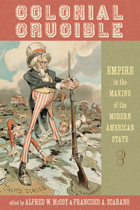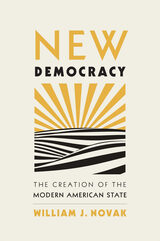
Moving well beyond theory, this volume takes the next step, adding a fine-grained, empirical texture to the study of U.S. imperialism by analyzing its specific consequences. Across a broad range of institutions—policing and prisons, education, race relations, public health, law, the military, and environmental management—this formative experience left a lasting institutional imprint. With each essay distilling years, sometimes decades, of scholarship into a concise argument, Colonial Crucible reveals the roots of a legacy evident, most recently, in Washington’s misadventures in the Middle East.

The activist state of the New Deal started forming decades before the FDR administration, demonstrating the deep roots of energetic government in America.
In the period between the Civil War and the New Deal, American governance was transformed, with momentous implications for social and economic life. A series of legal reforms gradually brought an end to nineteenth-century traditions of local self-government and associative citizenship, replacing them with positive statecraft: governmental activism intended to change how Americans lived and worked through legislation, regulation, and public administration. The last time American public life had been so thoroughly altered was in the late eighteenth century, at the founding and in the years immediately following.
William J. Novak shows how Americans translated new conceptions of citizenship, social welfare, and economic democracy into demands for law and policy that delivered public services and vindicated people’s rights. Over the course of decades, Americans progressively discarded earlier understandings of the reach and responsibilities of government and embraced the idea that legislators and administrators in Washington could tackle economic regulation and social-welfare problems. As citizens witnessed the successes of an energetic, interventionist state, they demanded more of the same, calling on politicians and civil servants to address unfair competition and labor exploitation, form public utilities, and reform police power.
Arguing against the myth that America was a weak state until the New Deal, New Democracy traces a steadily aggrandizing authority well before the Roosevelt years. The United States was flexing power domestically and intervening on behalf of redistributive goals for far longer than is commonly recognized, putting the lie to libertarian claims that the New Deal was an aberration in American history.
READERS
Browse our collection.
PUBLISHERS
See BiblioVault's publisher services.
STUDENT SERVICES
Files for college accessibility offices.
UChicago Accessibility Resources
home | accessibility | search | about | contact us
BiblioVault ® 2001 - 2024
The University of Chicago Press









